Nearly one in four Americans already claim to have been personally affected by President Obama’s health care reform. But the impact on them, as measured in the latest Economist/YouGov Poll is as much political as actual, and may reflect expectations as opposed to actual impact.
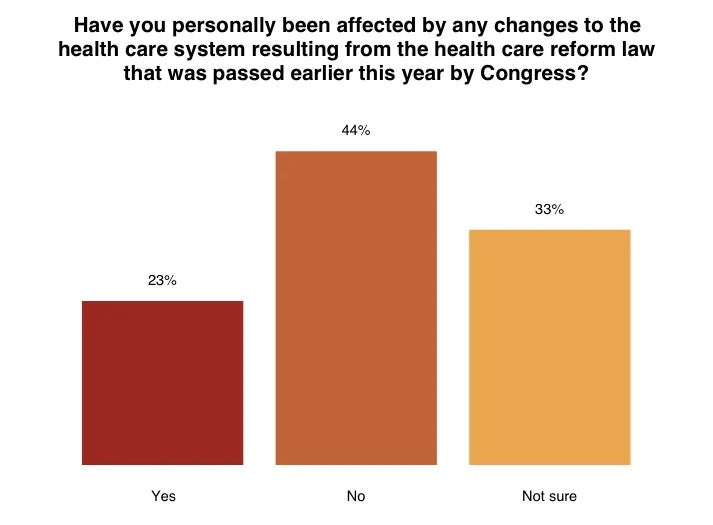
23% of respondents say they have been personally affected by the health care measures that have been implemented thus far. And by more than two to one, they say the impact has been negative, not positive. The reforms that went into place last week, like ensuring coverage for children up to the age of 26 and requiring insurers to cover children with pre-existing conditions, were meant to be extend coverage, not limit it.
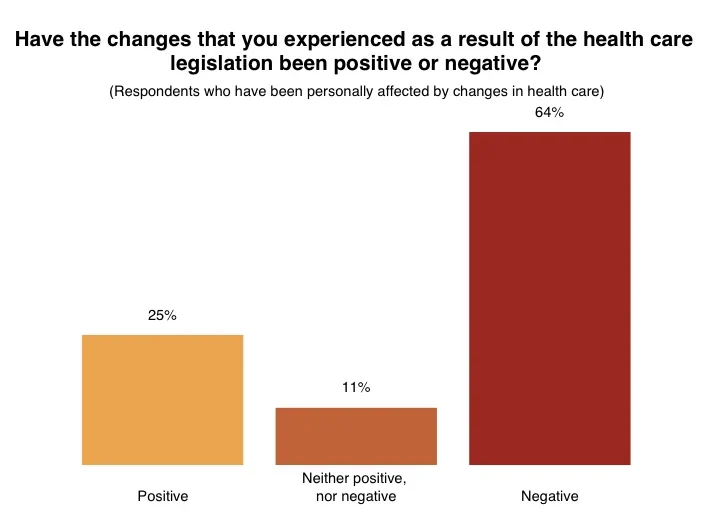
The assessments of the first changes are highly partisan – just as the assessment of the health care legislation has been all along: Republicans, who are more likely than Democrats to say they have been affected, are almost uniformly negative about the bill’s impact on them so far. Democrats are mostly positive.
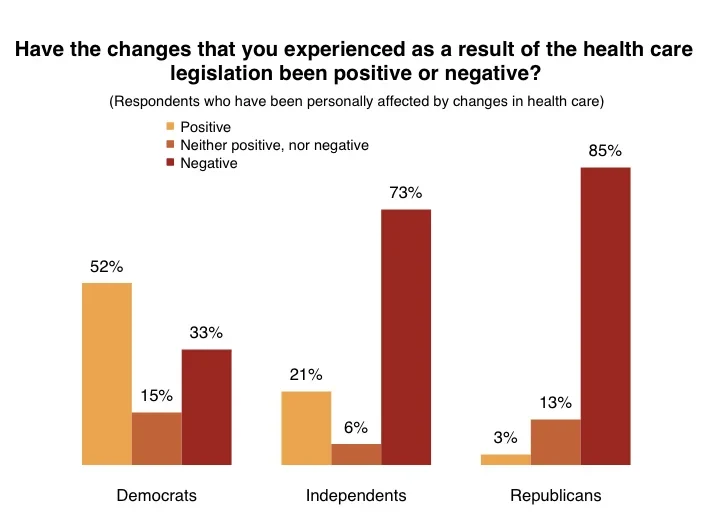
29% of those who reports being or having once been part of the target groups for the newly-implemented reforms say they have been affected; so do 20% of those who are not part of any of those groups. Majorities of both groups who say they have been affected say the impact has been negative. There is definitely concern about facing any change in health care. More than three in four of those with health insurance say they are satisfied with their current coverage. And while those without health insurance are not satisfied, most Americans have some sort of coverage.
Americans believe they understand the reform bill: 56% say they understand it at least somewhat well. But the contrast between generally liking many of the reforms that have been implemented thus far and fearing a negative personal impact is striking.
The reforms that have just been implemented are mostly popular with Americans. By 50% to 32% Americans favor requiring insurers to offer coverage for children up to the age of 26 in their parent’s policies. About six in ten would prevent insurers from changing higher premiums on those who are in poor health, or set lifetime caps on coverage. Americans also want to provide a minimum set of benefits to policyholders. 57% favor government subsidies for those with lower incomes.
Next, we'd like to ask you about some specific parts of the President's health care plan. Please tell us whether you are in favor of or opposed to the following provisions.
| Favor | Oppose | Not Sure | |
|---|---|---|---|
Require health plans to provide coverage for children up to age 26? | 50% | 32% | 18% |
Prevent insurers from charging more to cover people who are in poor health? | 65% | 20% | 15% |
Prevent insurers from imposing lifetime limits on benefits? | 65% | 17% | 18% |
Require all insurance policies to provide a minimum package of benefits? | 62% | 18% | 21% |
Provide a subsidy to help people with incomes of between $22,000 and $44,000 per year (for a family of 4) afford insurance? | 57% | 23% | 20% |
Require employers to offer their employees health insurance, or pay a tax penalty? | 47% | 36% | 17% |
Require all U.S. citizens and legal residents to have health insurance, or pay a tax penalty? | 25% | 56% | 20% |
There is less support when it comes to mandates for employers to provide health insurance coverage to their employees, and clear opposition – by more than two to one – to forcing individuals to have health insurance coverage or pay a fine.
Since early in the health care debate, there have been concerns about the costs and the impact of reform. There still are. By more than three to one, Americans think their own health care will be made worse, not better, by the legislation. Republicans and those over 65 are especially negative about the future of their health care.
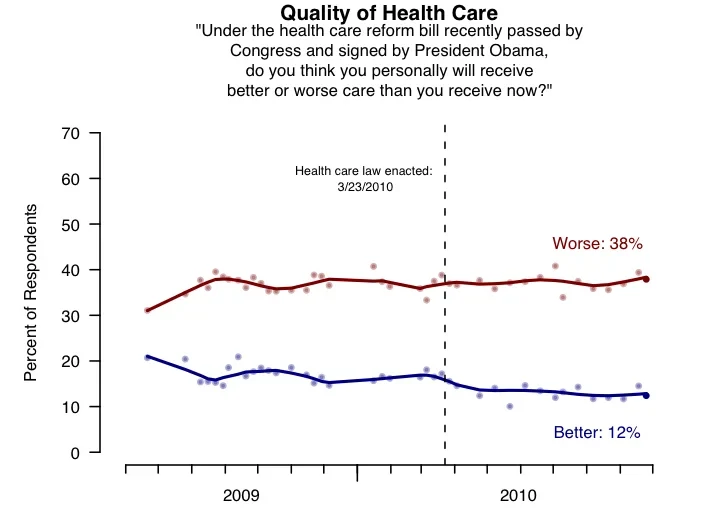
More than half the public believes they will have to pay more, either in higher premiums or in taxes, because of the legislation. Only 5% expect their costs to decrease. Again, concerns about costs have been part of the health care debate from the start.
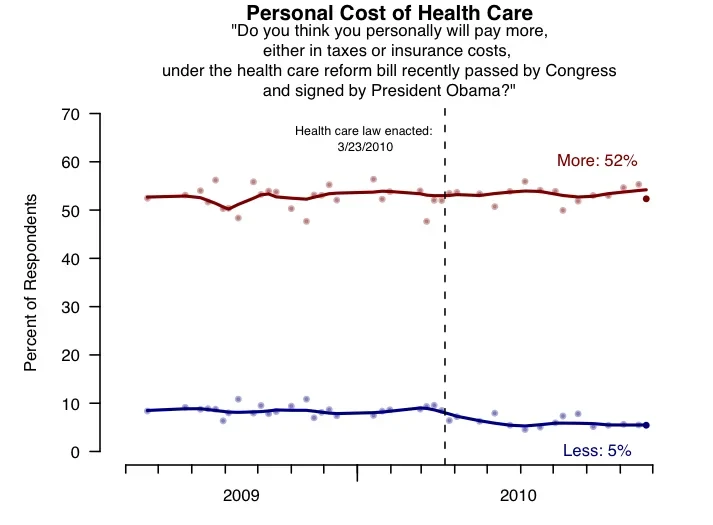
But Americans are more willing than not to have employers absorb the costs for the newly-implemented reforms. By 43% to 34% they favor adding children up to age 26 on to parents’ policies (at a cost of $200 per employee). By 41% to 32%, they favor prohibiting insurance companies from charging more to cover those in poor health (at a cost of $700 per employee). By more than two to one they support removing the lifetime cap on benefits ($100 per employee).
Below are the estimated costs per employee of some provisions of the President's health care plan. Please say whether you approve or disapprove of requiring these benefits to be provided if it costs this much to provide these benefits.
| Approve | Disapprove | Not Sure | |
|---|---|---|---|
Coverage for children up to age 26: $200 | 43% | 34% | 24% |
Prohibit charging more for persons in poor health: $700 | 41% | 32% | 26% |
Remove the lifetime limit on benefits: $100 | 51% | 23% | 27% |
They support these employer changes even though most recognize that employer health care costs would increase and that those costs could be passed along to workers through a reduced payroll.
Image source: flickr (fibonacci blue)








